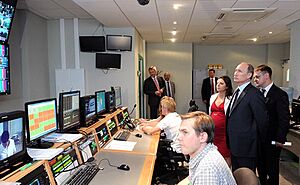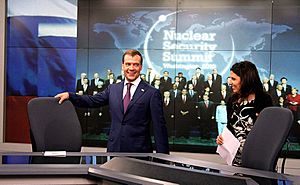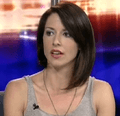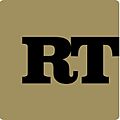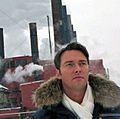RT (TV network) facts for kids
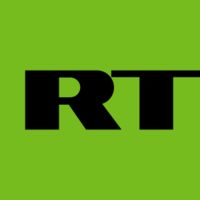 |
|
| Type | State media, news channel, propaganda |
|---|---|
| Country | Russia |
| Broadcast area | Worldwide |
| Headquarters | Borovaya Street, Building 3/1, Moscow, Russia |
| Programming | |
| Language(s) | News channel: English, French, German, Arabic & Spanish Documentary channel: English, Russian Online platforms: Portuguese (Brazil) & Serbian. |
| Picture format | 1080i (HDTV) (downscaled to 16:9 480i/576i for the SDTV feed) |
| Ownership | |
| Owner | ANO "TV-Novosti" |
| Sister channels |
|
| History | |
| Founded | 6 April 2005 |
| Launched | 10 December 2005 (registered on 6 April 2005) |
| Former names | Russia Today (2005–2009) |
| Links | |
| Webcast |
|
RT, which used to be called Russia Today, is an international news television network that is controlled and funded by the Russian government. It broadcasts news to people outside of Russia through TV channels and the internet. RT provides content in many languages, including English, Spanish, French, German, and Arabic.
The network was started in 2005 by the Russian news agency RIA Novosti. The Russian government, led by Vladimir Putin at the time, considered it a very important organization for the country.
Many people, including academics and other news reporters, describe RT as a propaganda tool for the Russian government. This means it is often used to promote Russia's point of view on world events. It has been accused of spreading disinformation (false information) and conspiracy theories. Because of this, some countries have banned RT.
For example, after Russia's annexation of Crimea in 2014, Ukraine banned the channel. Following the 2022 Russian invasion of Ukraine, the European Union and Canada also banned RT. Many social media and tech companies, like Apple and Microsoft, also blocked or limited access to RT's content.
Contents
The Story of RT
Why Was RT Created?
RT was created in 2005 as part of an effort by the Russian government to improve its image around the world. At the time, one of its founders, Svetlana Mironyuk, said that people in the West often thought of Russia in negative ways. She said they wanted to show a more complete picture of life in Russia.
The channel was first launched as Russia Today on December 10, 2005. It hired about 300 journalists, including some from outside Russia. Margarita Simonyan, who was only 25 at the time, was appointed as the editor-in-chief. She had previously been a reporter covering the Kremlin, which is the center of the Russian government.
How Did RT Grow?
In the years after its launch, RT expanded by creating new channels for different parts of the world.
- In 2007, it launched an Arabic-language channel called Rusiya Al-Yaum.
- In 2009, it launched a Spanish-language channel called Actualidad RT.
- In 2010, it launched RT America, which focused on the United States.
- In 2011, it launched the RT Documentary channel.
In 2009, Russia Today changed its brand name to just "RT." The goal was to attract more viewers who might not be interested in watching news only from Russia all day.
RT also became known for its advertising slogan, "Question More." One of its ads, which showed U.S. President Barack Obama turning into Iranian leader Mahmoud Ahmadinejad, was banned in American airports because it was seen as too controversial.
Famous Shows and Big Events
In 2012, RT started a show called World Tomorrow, hosted by WikiLeaks founder Julian Assange. His first guest was Hezbollah leader Hassan Nasrallah, which made headlines around the world because Nasrallah rarely gave interviews to Western media.
In 2013, famous American TV host Larry King began hosting a new talk show on RT called Politicking. King said he wanted to ask questions to powerful people, not just speak for them.
That same year, Russian President Vladimir Putin visited RT's new broadcast center. He said the goal of the channel was to "break the Anglo-Saxon monopoly on the global information streams," meaning he wanted to offer a different viewpoint from media like the BBC and CNN.
Bans and Restrictions After 2022
The 2022 Russian invasion of Ukraine led to major changes for RT. On February 27, 2022, the European Union announced it would ban RT and another Russian outlet, Sputnik, from broadcasting in all 27 of its member countries.
This decision had a ripple effect. TV providers in other countries, like the United Kingdom and Singapore, also had to stop showing RT because they relied on signals from EU companies. Major Canadian TV companies also removed RT from their channel lineups.
Tech companies took action as well.
- Facebook, Instagram, and TikTok blocked RT's content in the EU.
- Microsoft removed RT from its app store and search results.
- Apple removed the RT app from its App Store in all countries except Russia.
- YouTube blocked access to RT channels worldwide.
In March 2022, RT America shut down its operations and laid off most of its staff.
How RT is Organized
Who Owns RT?
RT was founded by the state-owned Russian news agency RIA Novosti. In 2013, President Putin created a new information agency called Rossiya Segodnya (which means Russia Today in Russian) to replace RIA Novosti. RT's editor-in-chief, Margarita Simonyan, was also put in charge of this new agency. This structure keeps RT closely tied to the Russian government.
How Much Money Does RT Get?
RT is funded by the Russian government. Its budget has grown significantly over the years.
- In 2007, its annual budget was about $80 million.
- By 2011, it had increased to $380 million.
- In 2015, the Russian government increased its funding to about $300 million.
Between 2022 and 2024, RT was set to receive 82 billion rubles from the government, making it the top state-funded media outlet in Russia. A large portion of this money is spent outside Russia to pay for distributing its channels around the world.
Where Can You Watch RT?
Before the 2022 bans, RT claimed its channels reached about 700 million households in over 100 countries. It had bureaus (offices) in 16 countries, including major cities like Washington, D.C., London, and Paris.
RT operates several channels in different languages:
- RT International: The main English-language news channel.
- RT Arabic: An Arabic-language channel.
- RT Spanish: A Spanish-language channel.
- RT Documentary: A channel showing documentaries, mostly about Russia.
- RT en Français: A French-language channel.
Many of these channels, like RT UK and RT America, were shut down after 2022.
What Kind of Content Does RT Show?
A Different Point of View
RT says its goal is to show an "alternative view" that is often ignored by Western media. However, many critics say this "alternative view" is actually propaganda designed to make Russia look good and to criticize Western countries, especially the United States.
RT often focuses on controversial topics and features guests who are critical of U.S. foreign policy. These guests can include academics, writers, and activists from both left-wing and right-wing perspectives. Some well-known figures like Noam Chomsky and Julian Assange have been featured.
The channel has been accused of giving a platform to conspiracy theories. For example, it has covered theories about the September 11 attacks and other events in ways that mainstream news outlets do not.
Coverage of Russia
When reporting on Russia, RT tends to focus on positive stories, such as the country's achievements in technology and culture. It often avoids or downplays serious problems within Russia, like corruption or limits on free speech. Journalists who have worked at RT have said that they were not allowed to directly criticize President Putin.
Coverage of World Events
RT's coverage of international events is often seen as biased. For example:
- During the 2008 South Ossetia war, RT presented Georgia as the aggressor, which matched the Russian government's position.
- During the 2014 unrest in Ukraine, RT's coverage was heavily criticized for being one-sided and misleading.
- During the COVID-19 pandemic, RT's international channels were accused of spreading misinformation about vaccines and masks, even while its Russian-language service encouraged people in Russia to take safety measures.
Responses and Criticisms
Resignations by Journalists
Several journalists have resigned from RT because they disagreed with its coverage.
- In 2008, correspondent William Dunbar quit during the South Ossetia war, saying the network would not let him report on Russian airstrikes that hit civilian areas.
- In 2014, Washington, D.C. anchor Liz Wahl resigned on air, calling RT a "propaganda network" for Putin.
- In 2014, London correspondent Sara Firth also resigned over the network's coverage of the Malaysia Airlines Flight 17 crash, calling it "outright misinformation."
Actions by Governments
Many governments have taken action against RT.
- United States: In 2017, the U.S. Department of Justice required RT America to register as a "foreign agent" of the Russian government. This means it had to disclose its funding and relationship with Russia.
- United Kingdom: The UK's media regulator, Ofcom, repeatedly found RT in breach of its rules on impartiality. In 2022, Ofcom revoked RT's license to broadcast in the UK.
- Germany: In 2022, Germany banned RT's German-language channel, RT DE, because it did not have a proper broadcasting license.
- European Union: The EU has sanctioned individuals connected to RT and banned the network entirely in 2022.
Praise and Defense
Not all feedback on RT has been negative. Some people argue that RT provides a valuable service by giving a voice to people and issues that are ignored by mainstream media. They say that RT covers topics like anti-war protests and corporate power in more depth than other channels.
Supporters also argue that all news networks have a bias, and RT is simply open about its Russian perspective. They believe that smart viewers can watch RT and decide for themselves what to believe.
Images for kids
-
Breaking the Set (2012–2015) presenter and correspondent Abby Martin
-
RT reporter covering the George Floyd protests in Iran in June 2020
-
Worlds Apart host Oksana Boyko with Filipino Foreign Affairs Secretary Alan Peter Cayetano.
See also
 In Spanish: RT para niños
In Spanish: RT para niños
- Disinformation in the 2022 Russian invasion of Ukraine
- Freedom of the press in Russia
- Media of Russia
- Russia Beyond
- Russian–Ukrainian information war
- Soviet Central Television
- RTLM
 | William Lucy |
 | Charles Hayes |
 | Cleveland Robinson |




